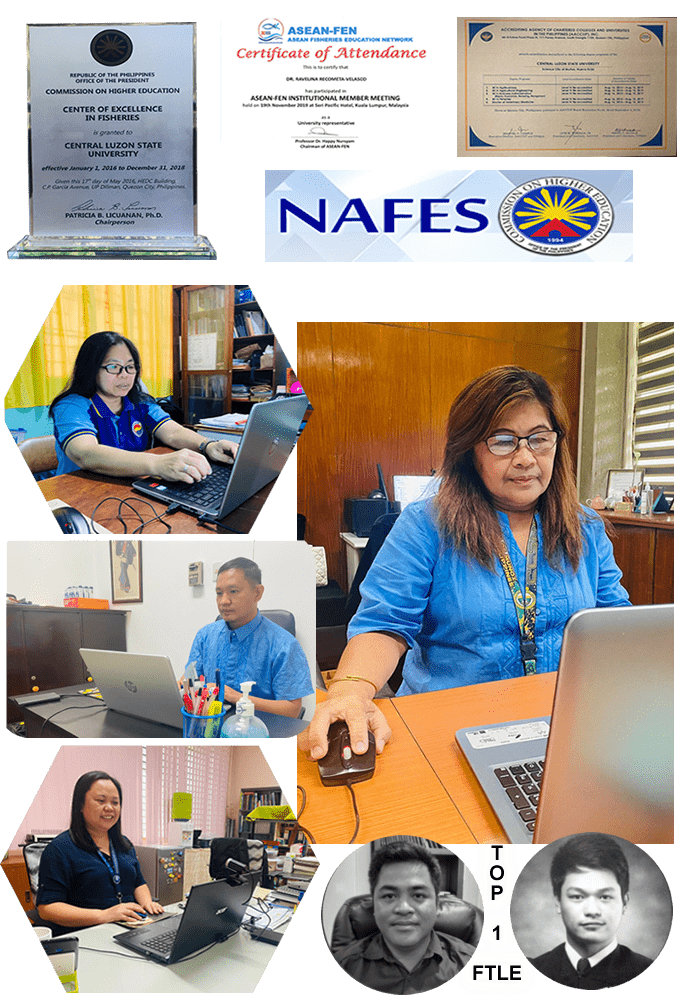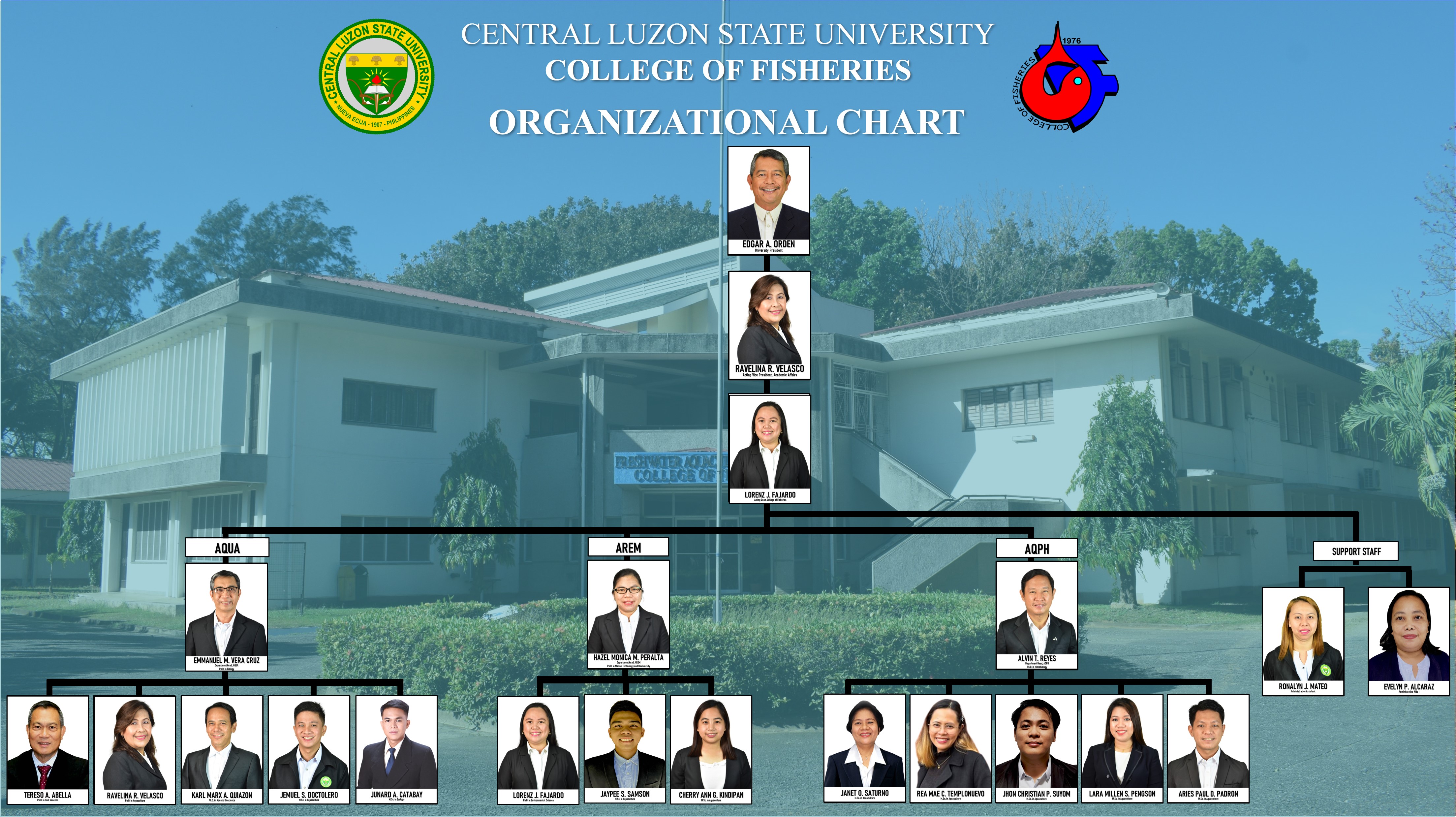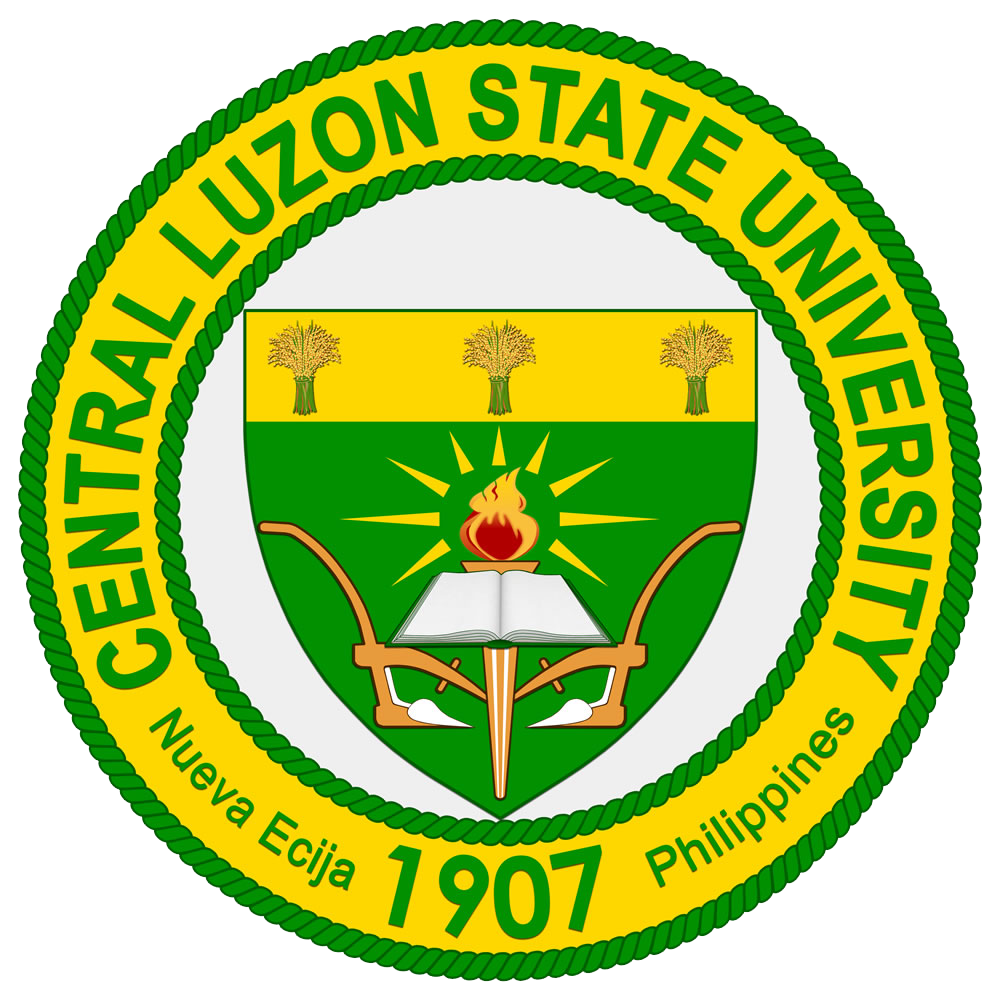
The college is located in the heart of the Tilapia Science Center in Science City of Muñoz, Nueva Ecija, Philippines. It aspires as a world class institution in fisheries education.
The college offers undergraduate and graduate degree programs. The BS Fisheries is a four-year-degree program designed to teach courses in ichthyology, aquatic biology and ecology, fish culture and breeding , aquaculture engineering, hatchery management, fish nutrition, fish health, fish capture, fishery laws, coastal resource management, research design and methods, aquatic post-harvest and entrepreneurship with interdisciplinary information from different fields like biotechnology, economics, genetics, meteorology and oceanography. The graduate programs are Master of Science in Aquaculture and Doctor of Philosophy in Aquaculture.
The academic ranks of faculty members are Professor Emeritus, Professor, Associate Professor, Assistant Professor and Instructor.
The three departments, aquaculture, aquatic resources, ecology and management, and aquatic post-harvest, support the curricular programs of the college.
The strengths of the College are:
Come on, the best starts with us!
Admission Open for AY 2024-2025
Be Part of CLSU Fisheries... and be like us.
For more information, visit the facebook page: facebook.com/collegeoffisheriesclsu

384
Total Number of Enrolled Students

95
Satisfaction Rate

1157
Total Number of Graduates

History
The establishment of the college in the 1970s was primed up with the involvement of CLSU in the Inland Fisheries Project of the University of the Philippines under the National Science Development Board (now Department of Science and Technology) with funding from the United States Agency for International Development with Dr. John H. Groover, a faculty member of Auburn University, Alabama, USA as USAID Inland Fisheries Adviser.
The first course in fisheries entitled “Introduction to Inland Fisheries” was offered in the second semester of school year 1972 – 1973. This was through the instigation of President Amado C. Campos, the man behind the development of CLSU. The course handled by Dr. John H. Grover was an elective to third and fourth year students taking Bachelor of Science in Agriculture.
The positive response of students enrolled in the course gave rise to a new major field in Inland Fisheries offered in the Bachelor of Science in Agriculture effective the first semester of SY 1974-1975. This new program was developed by Dr. Rafael D. Guerrero III, one of the Ten Outstanding Young Men for his pioneering work on the Sex Reversal Technology of tilapia.
The College of Inland Fisheries was established through Board Resolution No. 1604, s. 1976. The school year 1976-1977, offered a Bachelor of Science in Inland Fisheries (BSIF), major in Fisheries Management and Aquaculture, to fill the need for trained human resources vital to the development of the country’s inland fisheries sector. It offered a work-oriented curriculum leading to the degree of Bachelor of Science in Inland Fisheries which was considered the only one of its kind in the country then.
The first group of senior faculty members belonged to the famous "Auburn Mafia" in the Philippine Aquaculture as they have completed their advanced degrees in fisheries from Auburn University, USA. These faculty members were Dr. Catalino R. dela Cruz, Prof. Rodolfo G. Arce, Dr. Emmanuel Cruz, Prof. Luzviminda A. Guerrero. Among the junior faculty members hired were Mr. Tereso Abella, Ms. Carolina Banda, Mr. Nicostrato Perez, Ms. Eden Gonzales and Mr. Daniel Oreta.
In 1983, through the initiative of Dr. Catalino R. dela Cruz and a grant coming from the Japanese International Cooperative Agency (JICA) gave rise to the Freshwater Aquaculture Center Training Complex. The College of Fisheries in the campus was transferred to the new FAC complex to give the students better accessibility to the new facilities and laboratory equipment of FAC. Dr. Catalino dela Cruz was chosen as one of the Ten Outstanding Young Men of the Philippines (TOYM) for his work on integrated agri-aqua farming systems.
The middle part of the 80’s was marked by another change in the college leadership with Dr. Emmanuel M. Cruz taking over the stewardship and then to be followed by Dr. Rodolfo G. Arce.
In 1983, the college produced the first 3 academic honors (Cum Laude) in the person of Ms. Darcy Gutierrez, Ms. Ravelina M. Recometa and Ms. Liza Salvador, all were recipients of the PCAMRD scholarship grant. The commencement exercises of academic year 1983-1984 saw a fisheries student topping the graduating class with the highest academic honor (Summa Cum Laude) conferred for the first time by the university. This honor belonged to Mr. Emmanuel M. Vera Cruz, a member of the elite Ferdinand Marcos Fisheries Scholars.
In the ensuing year of 1987, the members of the University Board of Regents approved the renaming of the College of Inland Fisheries to College of Fisheries on July 24, 1991.
Upon the assumption of Dr. Eliseo L. Ruiz as President of CLSU in 1987, he appointed Dr. Guillermo Rillon from the College of Agriculture as Dean of the College. In his short stint as Dean of the College, he proposed the idea of having a collection of freshwater fishes. This significant idea, however, was realized after nine years through the establishment of the Living Fish Museum.
In the ensuing year, Prof. Renato D. Recometa was designated as the Dean of the College. Under his term, Prof. Recometa worked out to improve the present BSIF curriculum for wider scope by developing the BS Fisheries program with major field in Inland Fisheries and minor field in Marine Fisheries. In connection with this curricular change, the members of the University Board of Regents approved the renaming of the College of Inland Fisheries to College of Fisheries on July 24, 1991. Prof. Recometa had many plans for the College but in 1992 he dropped his working tools and joined his Creator. The vacuum created by his departure was filled up by Prof. Ruben C. Sevilleja. Two years after steering the College, Prof. Sevilleja left for the United Kingdom to pursue his PhD at the University of Wales, Swansea. The Officer-In-Charge of the College was appointed in the person of Dr. Arsenia G. Cagauan.
In the late 1980’s and early 1990’s, both faculty and students made their waves in their field of specializations. Prof. Arsenia G. Cagauan won the Best Paper Award in the Asian Fisheries Forum held in Singapore in 1992. Her research work was about the utilization of a nitrogen-fixing aquatic fern (azolla) in integrated rice-fish production system, funded by a research fellowship from the Asian Fisheries Society. She was also a recipient of the Most Outstanding Teacher for Region 3 in 1989. Ms. Mary Ann Garcia graduated Summa Cum Laude in 1989.
In July of 1994, Dr. Tereso A. Abella fresh from his PhD degree training at the University of Wales Swansea was appointed as the Dean of the College. He initiated additional scholarship programs for the students. For the first time, the College participated as a separate unit in the yearly university intramurals. Through his efforts and the rest of the faculty including the support of Pres. Fortunato A. Battad, the Living Fish Museum was established and inaugurated on March 3, 2000.
Under Dr. Abella’s stewardship, the college was identified as the Center of Excellence for Fisheries in Region III by the Commission on Higher Education. This was in accordance with the pertinent provisions of Republic Act of 1994 and by virtue of Resolution No. 42 – 2000.
On May 19, 2006, a revised BSF curriculum was approved under BOR Resolution 29-2006. The revised BSF curriculum addresses the minimum standards and requirements set by the CHED-Technical Panel in Agricultural Education in Fisheries (TPAE) [CMO 43, S., 2006], the areas of concern of Professional Regulation Commission (PRC) Fisheries Technologist Board Examination, and most importantly the needs of the fisheries and aquaculture industry in the country.
In 2008, the college was awarded as the Best Higher Education Institution in the country Also designated by the Commission on Higher Education - National Agriculture and Fisheries Education System (CHED-NAFES) as National University College of Fisheries (NUCF).
During the term of Dr. Remedios B. Bolivar, international collaborations and student scholarships abound; Dr. Apolinario V. Yambot and Dr. Emmanuel M. Vera Cruz, for their scopus indexed scientific publications, hence the college sustained its Center of Excellence and culture of research statures.
In 2017, Dr. Ravelina R. Velasco was designated Acting Dean, her term with discernable improvement in the facilities through the CHED COE grant, one of the top 3 delivering units in the university in 2018 and implemented externally funded researches. Her dream of the CF becoming a part of ASEAN-FEN was realized in November 2019, when she presented the status of the College of Fisheries during the ASEAN FEN Board of Director’s Meeting in Kuala Lumpur, Malaysia. The college was accepted as an Associate Member to ASEAN Fisheries Education Network (ASEAN-FEN). It is noteworthy to mention the recommendation of Dr. Emilia Encarnation Yap, Dean of the College of Fisheries and Oceanic Sciences in UP Visayas. ASEAN- Fisheries Education Network is a team of university based consortia representing the aquaculture oriented institutions within the Southeast Asia region.
The Technical Panel of Fisheries began revising the curriculum in 2018 and in December 2021, the Commissioner of the Philippine Higher Education signed the CHED Memorandum Order 33, series of 2021, the Policies, Standards and Guidelines for the Bachelor of Science in Fisheries.
Over the last 46 years, the CLSU BS Fisheries program has produced fisheries technologist topnotchers and prominent men and women in government agencies, academe ,private industries and successful entrepreneurs.
The undergraduate and graduate programs are aligned in three areas: 1. Instruction ( to provide formal education), 2. Research and training ( create, innovate, re-invent and disseminate knowledge) and 3. Community support services (application of knowledge and livelihood enhancement).
The College of Fisheries co-exists in a shared facility with the Freshwater Aquaculture Center (FAC) with CF faculty members serving as researchers to the center, thus, the Director of FAC is also the Dean of CF from 1982 until 2007.
The college working hand in hand in partnership with the Freshwater Aquaculture Center (FAC) implement the university’s programs and activities in fisheries and aquaculture. The synergy of CF and FAC has primarily contributed to the catapult of tilapia industry in the country.
To date, the excellence status was sustained through 2021 CHED memorandum.
Author: Dr. Tereso A. Abella
with inputs: Dr. Ravelina R. Velasco
VMGO
Vision
The College of Fisheries as a world-class institution of excellence in fisheries education.
Mission
The College of Fisheries shall produce a globally competitive human resource with knowledge and competencies in research, development and extension.
Goal
To develop fisheries professionals with expertise on sustainable and improved aquaculture management, production, protection and conservation of fisheries resources.
Objectives
To provide fisheries education that will enable the students and other stakeholders knowledgeable in global trends in fisheries and aquaculture;
To develop well-rounded students with competencies in fisheries education, research, development, management and entrepreneurship as future active partners in national and international development;
To produce fisheries technologists and professionals who will develop, generate and manage aquaculture production systems, postharvest, aquatic resources and ecology.
Administration
The College of Fisheries is directly supervise by the Office of the Vice President for Academic Affairs. THe Office of the Dean cascades information to the three departments namely: Aquaculture, Aquatic Resources, Ecology and Management and Aquatic Post-Harvest.



